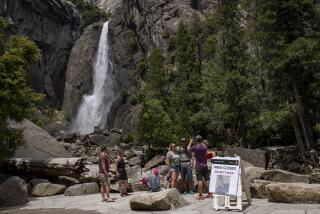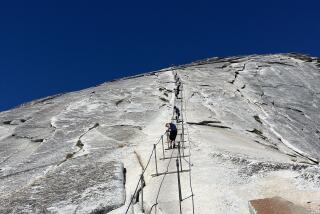Yosemite hike makes you feel 2,425 feet tall
YOSEMITE NATIONAL PARK — When hiking Yosemite Falls, the tallest waterfall in North America, keep an eye out for the unexpected.
Trekking up the steep path to the top, I couldn’t believe what I was seeing: A bright red dot seemed to float across the clear blue sky just above the 2,425-foot waterfall.
Once I made it to the top, I had a front-row seat for a sort of Mother Nature-style circus act. Walking barefoot across a thin rope suspended over the falls was a guy wearing sunglasses and a red Windbreaker.
That guy turned out to be Damian Cooksey, a world-renowned slackliner who owns a climbing and slacklining gym near Berkeley. Slacklining -- similar to tightrope walking and growing in popularity -- involves balancing on a rope stretched between two anchor points.
“It feels like you’re flying,” the 32-year-old Cooksey tells me after coming off the rope. “The waterfall is just so intense.”
Although very few will ever know the waterfall’s intensity in quite the same way, just hiking to the top is an accomplishment for many.
“It’s strenuous, but it’s just so worth it,” says Ryan McMullin, a 27-year-old Long Beach resident who trekked to the top with three friends.
The Yosemite Falls trail head can be found behind Camp 4, Yosemite Valley’s widely known camping and rock-climbing hot spot. From there (and for about the next 3 1/2 miles), it’s up, up, up. Hikers must quickly adjust to countless switchbacks -- steep zigzag parts of the trail that cut up the mountainside. Some switchbacks are in the shade; others are exposed in bright sunshine.
Built between 1873 and 1877, the trail to the top of Yosemite Falls is one of the oldest -- and steepest -- in Yosemite National Park. Rangers recommend setting aside six to eight hours to complete the hike.
The breathtaking views of Yosemite Valley and the park’s back country from the summit do come at a cost, however, as the exhausted, sweaty hikers resting on rocks can attest. About a mile up the trail is Columbia Rock, providing a scenic resting spot with a great view of Half Dome.
Yosemite Falls is considered the highest measured waterfall in North America and one of the tallest on Earth. The waterfall is broken up into three parts: the 320-foot lower falls, 675-foot middle cascades and 1,430-foot upper falls.
For those wanting to experience the falls without trekking to the top, a mile-long paved path in Yosemite Valley has spectacular views of both the upper and lower falls. This flat, easy walk loops through tall pines and brings hikers to the base of Lower Yosemite Fall.
Melanie Natoli, vacationing from Virginia, closed her eyes and smiled as she stepped into the mist sprayed by the waterfall. Expect a soaking in the spring and early summer when the falls are at their most robust as the snow melts. (The falls are often dry by early August.)
“This is really incredible,” Natoli says. “It’s the perfect time of year to come here.” Undoubtedly, what draws visitors to Yosemite each spring are the park’s rushing waterfalls -- Bridal- veil, Vernal, Nevada. Yosemite Falls, however, overshadows them all with its grandness and accessibility.
In the valley, tourists snap photos while the waterfall is discussed with great enthusiasm in languages from around the world. A few people with binoculars watched Cooksey walk above the waterfall.
Inspired after witnessing his exhilarating stunt up close, I began my journey back down the trail.
At the halfway point, I looked up from the slippery rocks I was crossing to see a final surprise: a brilliant rainbow arched at the waterfall’s base. Ah, the magic of Yosemite.
--
More to Read
Sign up for The Wild
We’ll help you find the best places to hike, bike and run, as well as the perfect silent spots for meditation and yoga.
You may occasionally receive promotional content from the Los Angeles Times.






